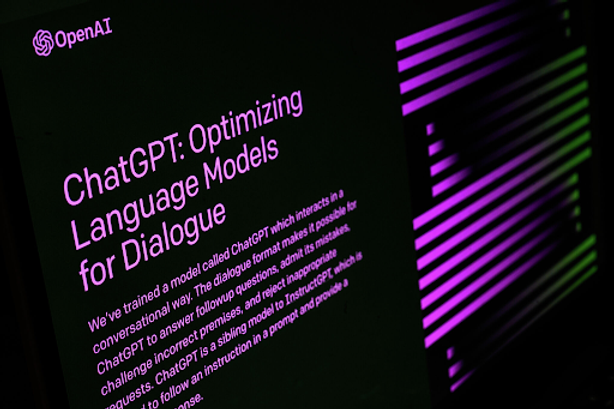Imagine a world where language is no longer a barrier, where AI-powered chatbots can communicate with humans seamlessly, and where every idea and emotion can be expressed in the most eloquent of terms. While the meteoric rise of ChatGPT is bringing us closer to that future, it’s also raising questions about the impact of AI on human communication.
ChatGPT was released by OpenAI in June 2020, making it a relatively new addition to the world of artificial intelligence chatbots. The release of ChatGPT was part of OpenAI’s larger mission to advance AI research and create cutting-edge technologies that can benefit society as a whole. By developing ChatGPT, OpenAI hoped to create a chatbot that was capable of engaging in more natural and intuitive conversations with humans, while also pushing the boundaries of what AI is capable of achieving.
Since its initial release, ChatGPT has rapidly become one of the most powerful language models in the world. With its deep learning algorithms and massive database, ChatGPT is capable of generating remarkably human-like responses to text-based prompts, from casual conversations to complex technical queries.
While ChatGPT’s language processing capabilities are impressive, some argue that the model still falls short of human-level writing in terms of creativity, coherence, and context awareness. Those dismissive of the AI might be surprised, then, to discover that everything in this article thus far was written by ChatGPT itself even the title.
The AI generative software garnered 1 million users in its first week, likely due to its impressive ability to process large volumes of text and generate coherent responses in a matter of milliseconds. The question then becomes: how will ChatGPTs capabilities affect the landscape of communication as we know it?
As ChatGPT continues to improve, a major concern is that it will automate many tasks typically done by humans, such as writing, journalism, or legal work. Fortune reports that about 40% of workers who are familiar with ChatGPT are concerned the artificial intelligence chatbot will replace their jobs entirely. While this fear isnt completely unfounded, AI still has a long way to go before it can match or exceed human capabilities.
According to Ian Bogost, contributing writer for The Atlantic, ChatGPT lacks the ability to truly understand the complexity of human language and conversation. It is simply trained to generate words based on a given input, but it does not have the ability to truly comprehend the meaning behind those words. In essence, as sophisticated as ChatGPT may sometimes seem, it is no match for human intelligence yet simply because it cant critically analyze any prompt it is given.
This leads to another obstacle ChatGPT must overcome: accuracy. In an article by Mashable, writer Mike Pearl discovers that ChatGPT often gives blatantly incorrect answers. ChatGPT was mistaken on geography, historical facts, logic problems, and more when asked by Pearl. Again, this comes down to an issue of how much the AI can truly comprehend: ChatGPT knows nearly everything, but understands next to nothing.
So how big of a deal is ChatGPT, then? In the words of Bogost, Computers have never been instruments of reason that can solve matters of human concern; theyre just apparatuses that structure human experience through a very particular, extremely powerful method of symbol manipulation. ChatGPT will undoubtedly change how we communicate, but not by replacing humans altogether. Instead, people may find it most useful as a tool that aids in conversation rather than eclipsing it. A decade from now, ChatGPT might be as ubiquitous as Google, Bing, or any other search engine we currently use.
Many proclaim that ChatGPT is the future, but it would be more accurate to say that ChatGPT is still shaping the present. Instead of fear-mongering about how it might ruin lives, we should start learning how to integrate and mold this blossoming technology in a way that is beneficial. With AIs knowledge and humanitys understanding, an optimized communication landscape will be on the horizon.
Works Cited
Bogost, Ian. ChatGPT Is Dumber Than You Think. The Atlantic, 7 December 2022, https://www.theatlantic.com/technology/archive/2022/12/chatgpt-openai-artificial-intelligence-writing-ethics/672386/. Accessed 12 April 2023.
Council, Stephen. AI, explained: The everyday person’s guide to ChatGPT. SFGATE, 12 February 2023, https://www.sfgate.com/tech/article/chatgpt-openai-everyday-guide-17777804.php. Accessed 12 April 2023.
Leonhardt, Megan. Workers are concerned AI like ChatGPT will take their jobs. Fortune, 25 March 2023, https://fortune.com/2023/03/25/workers-worried-about-chat-gpt-ai-taking-jobs/. Accessed 12 April 2023.
Pearl, Mike. ChatGPT from OpenAI is a huge step toward a usable answer engine. Unfortunately its answers are horrible. Mashable, 3 December 2022, https://mashable.com/article/chatgpt-amazing-wrong. Accessed 12 April 2023.
 Sophia Mekbeb, Alumni at APA
Sophia Mekbeb, Alumni at APA 
 Why Rising Gas Prices are Important
Why Rising Gas Prices are Important